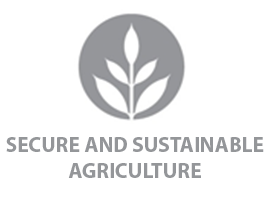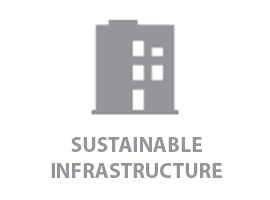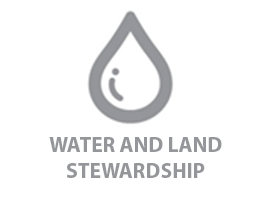Stored solar stove project
(2014-19)
Research Menu
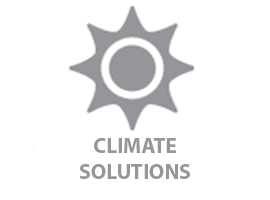 Current
Current
Funded
iSEE Work
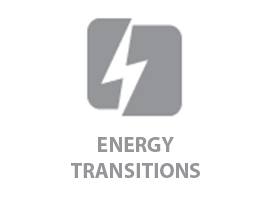 Current
Current
Funded
iSEE Work
Current
Funded
iSEE Work
Current
Funded
iSEE Work
Current
Funded
iSEE Work
 Project Overview
Project Overview
![]()
![]() Running from 2014 to 2019, the Stored Solar Stove Project fit into the iSEE research themes of Energy Transitions and Climate Solutions.
Running from 2014 to 2019, the Stored Solar Stove Project fit into the iSEE research themes of Energy Transitions and Climate Solutions.
In Lead Investigator Bruce Elliott-Litchfield’s words:
“We are working on the so-called Global Cooking Problem. Three billion people — nearly half the world’s population — still cook using solid fuels and that causes over 4 million deaths per year. That’s more than malaria, tuberculosis, and HIV/AIDS combined.
“Many others are working on this problem, but almost all of them are designing improved combustion stoves. That is, they still burn wood or charcoal or dung, and they still create emissions. We chose to take a more dramatic approach. We have a technology that cooks without fire, without fuel, and creates no emissions, and it is viable virtually worldwide. Here’s how:
“The earth receives more solar energy every hour than civilization uses in an entire year. And so we want to use some of that free, clean energy.
“You may be thinking, ‘Solar cookers are slow, they don’t get hot enough, and they can’t cook when the sun’s not out.’ You may be thinking, ‘Solar cookers don’t really work.’
“But we are developing systems to concentrate, collect, store, and then recover solar thermal energy at high temperatures — near flame temperatures, and that’s key for replacing fire cooking. Another key: Storing the solar heat so you can cook later — and in a different location — is essential. You have to be able to cook at night or even the next day or even several days later for this technology to be widely adopted.
“It also helps that the stored energy can be used for space heating, or for cooling, or for generating electricity to charge phones or provide lighting. We believe that with sufficient R&D investments we can develop systems that can be sold for use by hundreds of millions — maybe billions — of those who currently cook with solid fuel. And we expect this technology to find applications in the developed world as well.”
Project News
- Summer 2019 Progress Update
- Summer 2018 Progress Update
- Summer 2017 Progress Update
- Sun Buckets Startup Earns $100K in Clean Energy Trust Challenge
- Team wins Ocean Exchange 2016 Gulfstream® Navigator Award
- Summer 2016 Progress Update
- Sun Buckets Inc. Students Win Cozad Award
- Materials Testing Continues
PI Bruce Elliott-Litchfield reports the following accomplishments during the past year:
-

As part of her $29,500-per-year Link Energy Fellowship (see 2018 project update for more), Ph.D. Candidate Sam Lindgren spent the Spring 2019 semester in Namibia studying the impact of children on their parents’ cooking energy decisions.
- “We have begun fabrication of the beta model Sun Bucket, including casting of the inner vessel by a central Illinois foundry,” Litchfield said.
- Postdoc Matthew Alonso and Intern Rashna Raham are conducting peanut drying tests that use Sun Buckets as the energy platform for a new off-grid dryer, funded with a $50,000 grant from the Archer Daniels Midland Institute for the Prevention of Postharvest Loss.
- Several Sun Buckets systems have been shipped to the Indian Oil Co. for testing.
- “We continue exploring partnership options with organizations that can facilitate marketing, distribution, fabrication, and financing,” said Litchfield, who also attended a Clinton Global Initiatives meeting in January 2019 in San Juan, Puerto Rico (photo above). The meeting included more than 500 leaders from business, government, and philanthropy to make commitments to support recovery on Puerto Rico and across the Caribbean region.
 In June 2019, Alonso collected the Governor’s Award for New Exporter of the Year in Chicago. Read the article in The News-Gazette >>>
In June 2019, Alonso collected the Governor’s Award for New Exporter of the Year in Chicago. Read the article in The News-Gazette >>>- In addition, United Nations Humanitarian Grand Challenges (UNHCR) facilitated an approximately $185,000 (250,000 Canadian dollars) grant (one of 22 funded by the U.S. Agency for International Development (USAID) from among 643 applicants) to study the use of Sun Buckets in conflict zones. In August 2018, Sun Buckets sent a team to field test and demonstrate prototypes in the UNHCR Kakuma Refugee Camp in northern Kenya (pictured right). That same month, another team tested the Sun Buckets in Somaliland, Somalia. Read more about the UNHCR project >>>

Sun Buckets Chief Technical Officer Matt Alonso explains the dish charging process to staff in Haiti.
The team reports the following developments from the past year:
- Matthew Alonso completed his Ph.D. in Agricultural and Biological Engineering in May 2018 with his work on Sun Buckets storage materials, and Samantha Lindgren won a prestigious Link Energy Fellowship for 2018-20 as one of three chosen among 118 applicants. Lindgren’s project is titled “The Role of Namibian Youth in the Advancement of Sustainable Energy,” and she will receive $29,500 a year for her continued Ph.D. work with Sun Buckets.
- The group reached an agreement with the Indian Oil Corp. to sell 10 prototypes and field test in India. “We hope that this is the first stage of a multi-stage project with India’s largest energy company,” PI Bruce Elliott-Litchfield said.
- Sun Buckets sold eight prototypes to campus Dining Services for use in the Lincoln Avenue Residence Hall’s dining hall “Field of Greens,” again with hopes that this is the first stage of a multi-stage project.
- In August 2018, Sun Buckets will send a team to field test and demonstrate prototypes in the UNHCR Kakuma Refugee Camp in northern Kenya as one of 23 selected seed projects that would receive grants of up to $250,000 each over a maximum of 24 months from the U.S. Agency for International Development (USAID) to support the validation and testing of new approaches. That same month, the same thing will be going on in Somaliland, Somalia.
- Sun Buckets continues to operate a successful field trial in Les Cayes, Haiti.
 The team reports several developments from the past year:
The team reports several developments from the past year:
- A patent application was submitted May 28, 2017, with claims for the product and the process used to make Sun Buckets.
- Team member Sam Lindgren traveled to Les Cayes, Haiti, with a representative of LSM, the Sun Buckets partner there, and installed and did training on several new solar stoves. “The units are working well, and we are learning from the pilot installations,” PI Bruce Elliott-Litchfield said. “LSM has purchased 24 systems to equip six of their homes. Fabrication is nearly complete, and delivery was scheduled for this summer.”
- Team members have met with three fabricators based in Illinois to get quotes for manufacturing 100 units. The bids will help the team better understand production costs and help prepare for delivery of the first commercial units.
- Team member Matthew Alonso is working with a professional welder to develop automated welding of the inner vessel, a critical part of the fabrication process.
- Sun Buckets is working with Underwriters Laboratory for independent safety testing.
- The team is also exploring several partnership options with organizations that can facilitate marketing, distribution, fabrication, and financing.
- Said Litchfield: “We see significant opportunities for research and development of long-term thermal storage. That is, storing energy for days, weeks, and even months (e.g., through a rainy season). We are seeking appropriate sources of funding.”
Team members from Sun Buckets, the Stored Solar Stove startup company, earned four awards totaling $100,000 in May 2017 at the Clean Energy Trust Challenge in Chicago.
Sun Buckets was awarded the ComEd Female Founder award ($20,000), the Hanley Family Foundation award ($20,000), the Power Clean Cities award ($20,000), and $40,000 from the Clean Energy Trust’s discretionary fund.
“Sam Lindgren was stellar delivering the pitch, and Joe Bradley expertly joined her for the Q&A,” said Sun Buckets CEO and Stored Solar Stove Project Principal Investigator Bruce Litchfield. “All contributed in various ways, including informal discussions with the investment committee and other attendees during the event in Chicago. We made several new contacts, had great fun, and are looking forward to what’s next.”
Clean Energy Trust funds and grows early stage clean energy startups in the Midwest through direct investment and venture development. According to its news release, since 2011, Clean Energy Trust has invested in 34 startups across the Midwest. Clean Energy Trust Challenge companies have raised an additional $112 million in funding and created more than 300 new jobs. To learn more, visit cleanenergytrust.org.

Samantha Lindgren of Sun Buckets accepts the 2016 Navigator Award from Ira Berman of Gulfstream®.
Student team members of Sun Buckets — the startup company launched out of iSEE’s Stored Solar Stove project — are the recipients of The Ocean Exchange’s 2016 Gulfstream® Navigator Award.
Presented each year at The Ocean Exchange’s Annual Event, this $100,000 award honors an outstanding innovation that demonstrates positive impact on the environment, economies, and health while respecting cultures around the world and has applications across multiple industries.
 The team reports several developments from the past year:
The team reports several developments from the past year:
- A means to quickly recover the stored energy from the “Sun Bucket” vessel for cooking and other uses.
- A new way to seal the vessel and ensuring safe operation.
- A prototype that keeps the vessel in the focal point of the charging dish, thereby reducing charge times by 25-40%.
- Testing on a tracking mechanism to maintain focus on the sun throughout the day.
- New contacts (and new testing of the Sun Buckets system and cooking) at Navajo Tech University in Crownpoint, N.M., Climate Healers in India and Navajo Nation; LSM NGO in Haiti; and an Environmental Education Center in Namibia.
- A new cooking blog by team member Samantha Lindgren (photo at right).
- A connection with the Green Restaurant Association to explore domestic markets.
- Continued data processing toward construction of solar mapping, total global potential, and prime starter locations.
Congratulations to the students who are working on the iSEE-funded Stored Solar Stove Project for earning a $5,000 Best Energy Specific Venture Award at the 2016 Cozad New Venture Competition on campus.
The award, announced April 28, 2016, recognized the team for having the most promising energy-related startup — now known as Sun Buckets Inc.
More on the Cozad Awards can be found on the Technology Entrepreneur Center website.
In addition, congratulations to Stored Solar Stove team member Matthew Alonso, a Ph.D. Candidate in Agricultural and Biological Engineering, who was a finalist and runner-up for the annual Illinois Innovation Prize.
In Spring 2015, Ph.D. graduate student Matthew Alonso and undergraduates Sid Madhulbalan and Blake Banks continued to test candidate materials for storing solar energy. When any material is left in the sun it gets warm — but not warm enough to cook on necessarily. To replicate the feel of cooking over fire (the most dominant type of cooking in developing countries), a solar storage material must gather large amounts of energy from sunlight and then release that energy evenly at high temperature when taken out of the sun and into the home. So far, the team has has the greatest success with certain types of salt blocks. After a summer’s worth of work, the students have been able to achieve a consistent boil time of less than five minutes for 1 liter of water. They’ve also been able to cook meals — their specialty is naan bread — on prototype designs.
The Team
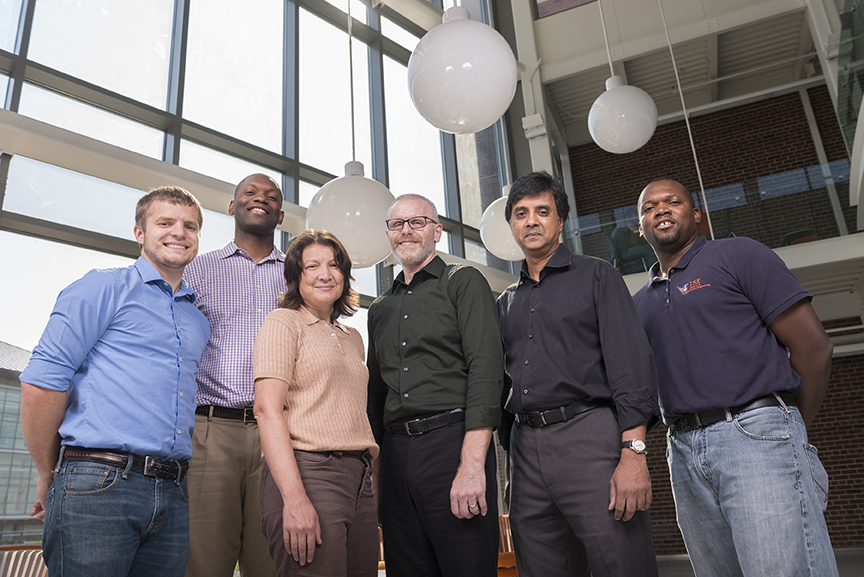
From left: Original Stored Solar Stove team members Matthew Alonso, Ndu Egekeze, Tami Bond, Bruce Elliott-Litchfield, Madhu Viswanathan, and Joe Bradley.
Principal Investigator and co-PIs
- Bruce Elliott-Litchfield, Emeritus Professor of Agricultural and Biological Engineering and Sun Buckets Chief Executive Officer. His departmental page.
- Joe Bradley, Teaching Associate at IEFX-Illinois Engineering First-Year Experience and Sun Buckets Chief Financial Officer. His office page.

Front row, from left: Students who participated in 2016 on the Stored Solar Stove project included Samantha Lindgren, Emily Floess, Catherine Zhou. Back row: Blake Banks, Keilin Jahnke, Matthew Alonso.
Operating team
- Matthew Alonso, Postdoc in Agricultural and Biological Engineering and Sun Buckets Chief Technical Officer. Read more about Matthew and his work >>>
- Samantha Lindgren, Ph.D. Candidate in Agricultural and Biological Engineering and Sun Buckets Advisor. Read more about Sam and her work >>> Visit her Cooking with Sun Buckets blog.
- Maria Jones, Visiting Project Specialist in Agricultural and Consumer Economics and Sun Buckets Director of International Marketing
- Robert Wright, Graduate Student and Sun Buckets Brand Manager
- Rashna Raham, Undergraduate in Agricultural and Biological Engineering and Sun Buckets Intern
- Rachel Tham, Undergraduate in Agricultural and Biological Engineering and Sun Buckets Intern
- Ezra Wallon, Undergraduate in Agricultural and Biological Engineering and Sun Buckets Intern
Former Team Members
- Tami Bond, former Professor of Civil and Environmental Engineering.
- Madhu Viswanathan, Professor of Business. His departmental page.
- Ndu Egekeze (second from left in top photo), Corporate Liaison at IEFX-Illinois Engineering First-Year Experience
- Keilin Jahnke, Ph.D. Candidate in Agricultural and Biological Engineering and Sun Buckets Marketing & Sales Officer. Read more about Keilin and her work >>>
- Emily Floess, M.S. Candidate in Environmental Engineering. Read more about Emily and her work >>>
- Blake Banks, Undergraduate in Agricultural and Biological Engineering
- Moosa S Al-Nimer, Undergraduate in Computer Engineering
- Sid Madhubalan, Undergraduate in Mechanical Engineering
- Calvin Smith, Undergraduate in Civil Engineering
- Tyler Traywick, Undergraduate in Electrical Engineering
- Brendan Wolan, Undergraduate in Materials Science and Engineering
- Catherine Zhou, Undergraduate in Chemical Engineering
- Steven Morse, Undergraduate in Mechanical Engineering
- Omeed Salo, University High School
- Rahi Salo, University High School
Educational Partnerships
- During Spring 2018, two MechSE 470 senior design teams worked on Sun Buckets projects.
- The MechSE Senior Design Team #19 of Spring 2016 helped make improvements to the Sun Bucket parabolic dish and prototyped a tracking system.
- Viswanathan’s class, BADM 532 “Sustainable Product and Market Development for Subsistence Marketplaces,” lent a helping hand on the project during the 2014-15 and ’15-’16 academic years. Read bios of the student 2015-16 team.
Publications & Presentations
(iSEE team members names in bold)
- Presentation: Conference papers. Alonso, M.; Floess, E. Solar Cookers International Conference, Goraj, Vadodara, Gujarat, India, January 2017.
- Presentation: Sun Buckets research, product, and startup business model (earned Gulfstrean Navigator Award), Lindgren, S. Ocean Exchange Annual Event, Savannah, GA, November 2016. Watch a video of Lindgren’s TED-styled talk about the global cooking problem, and how Illinois research is addressing it >>>
Read More about Sun Buckets …
Follow Online
Website: sunbuckets.com
Blog: Cooking with Sun Buckets
Get Social
Facebook: Sun-Buckets
